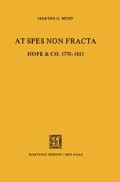Abstract
Robert Voûte arrived in Warsaw at half past eleven on the night of 24th July 1793. It was pouring with rain. He had left Berlin on the 19th and, despite the discomforts of the journey, had travelled day and night over roads which had been turned into quagmires by an incessant downpour.1 But Voûte allowed himself and his companions no more than a day or two’s rest before resuming the journey to Grodno, more than 250 kilometres distant. There, the Polish sejm had been in session since the 17th. Among the issues facing it were demands from Russia and Prussia for fresh territorial concessions.2 Hope had a direct interest in this matter, for such concessions would significantly affect the Polish state finances, with which the Company had been concerned for more than fifteen years.
Access this chapter
Tax calculation will be finalised at checkout
Purchases are for personal use only
Preview
Unable to display preview. Download preview PDF.
References
Chapter Four Page 111
27th July 1793, Letter from R.Voûte, Warsaw, to J.Williams Hope, Amsterdam.
R.H.Lord, The Second Partition of Poland (Cambridge, Mass., 1915), 460.
Page 112
J. Rutkowski, Histoire Economique de la Pologne avant les partages (Paris, 1922), 232.
Constitution of the sejm held in Warsaw in 1776, entitled ‘L’assurance de Nos dettes royales.’
Rutkowski, Histoire Economique de la Pologne, 26, 231–232.
G.A.Amsterdam, ‘Handel en Nijverheid,’ N 12.16.03.
Grootboek 1777: 299, 421. Cf. ordinance by King Stanislaw for the loan of 1786. The grootboeken for the years 1777 to 1787, inclusive, reveal that interest and capital were duly paid.
Page 114
Constitution of the sejm held in Grodno on 4th October 1784, entitled ‘Etablissement du fonds pour payer le reste de Nos dettes royales.’
Elias, Vroedschap, 1, 333-334. The Van Hoorn loan bore interest at 5%. For the 1786 loan, the Court Bankers furnished Hope with drafts in favour of Gülcher & Mulder; this house, as we shall see, also negotiated loans for the Polish magnates.
From the protocol of the Commission Economique du Trésor de Sa Majesté, dated 5th January 1785.
Excerpt from the proceedings of the session of the Chamber of Finances of the King held on 22nd April 1785.
Declaration by the Treasury Committee, made at the request of the Economic Committee of His Majesty, on 13th August 1785.
Page 115
Lord, Second Partition, 71, 72.
Letter of 31 st December 1785 from King Stanislaw, Warsaw, to De Wickedé, Amsterdam. As a young man, the king had travelled in western Europe.
Letters of 15th February and 19th March 1786 from King Stanislaw, Warsaw, to De Wickedé, Amsterdam.
Contract dated 7th April 1786. The entrepreneurs were committed to settle in three equal instalments on 1st August, 1st October and 1st December. If, on 15th May, the principal obligation was not properly signed, or the contract with De Wickedé was not in order, the entrepreneurs were to be relieved of their obligations and Hope was to pay them ¼% of the sum subscribed, by way of compensation for the risks borne by them. The latter provision clearly served as a lever in the negotiations with De Wickedé. In the event, the contract with him was not signed until 5th May 1786. Hope’s share of the loan was cf 500,000.
Page 116
The mortgages in the principal debenture dated 21st April 1786 now comprised
The subsidium charitativum, amounting to seven million Polish guilders
‘All the wealth and property, present and future, which belongs to us’
The income paid to the king by both Treasuries, amounting to four million Polish guilders per annum. Repayment was to be effected in 20 half-yearly instalments, commencing on 1st July 1787.
350,000 ducats at cf 5.5.0 (the rate of exchange of the ducat for the purpose of the loan of 1777): cf 1,837,500 94% of cf 2,000,000, less 1% of 7 months’ interest (on 1st January 1787): cf 1,871,167.
Grootboek 1787:128. Also Receipt dated 3rd June 1786, from Tepper and Blanc for the proceeds of the 1786 loan.
Letters of 15th February and 19th March 1786 from King Stanislaw, Warsaw, to De Wickedé, Amsterdam.
Hope suffered a small loss in connexion with the terms of settlement for the entrepreneurs, but this was more than compensated by the favourable interest computation.
Letters of 24th and 25th June 1787 from Hope & Co., Amsterdam, to De Wickedé, Amsterdam, P.C. ′87, 9, 11.
Page 117
Letter of 25th June 1787 to King Stanislaw, Warsaw, P.C. ′87, 13. Letter of 4th January 1788 to King Stanislaw, Warsaw, P.C. ′88,10. Letter of 4th January 1788 to De Wickedé, Amsterdam, P.C. ′88, 11.
Grootboek 1790: 177.
Rutkowski, Histoire Economique de la Pologne, 232-233.
Lord, Second Partition, 125.
Page 118
Ibid., 287.
Ibid., 391.
W. Roosegaarde Bisschop, De opkomst der Londensche geldmarkt 1640–1826 (The Hague, 1896), 98–99.
K.L. Blum, Ein russischer Staatsmann: des Grafen Jakob Johann Sievers Denkwürdigkeiten, III (Leipzig and Heidelberg, 1858), 59–60, 109-110.
Page 119
Letter of 27th July 1793 from R.Voûte, Warsaw, to J.Williams Hope, Amsterdam.
Letter of 19th August 1793 from R.Voûte, Warsaw, to J.Williams Hope, Amsterdam.
Page 120
Lord, Second Partition, 474-475.
Letter of 19th August 1793 from, R.Voûte, Moscow, to J.Williams Hope, Amsterdam.
Page 121
Voûte was mistaken about this. As we saw earlier, the instalments of interest and principal were guaranteed by the sejm: in other words, by the Republic itself. Subsequent events also conflict with Voûte’s statement.
Author information
Authors and Affiliations
Rights and permissions
Copyright information
© 1974 Martinus Nijhoff, The Hague, Netherlands
About this chapter
Cite this chapter
Buist, M.G. (1974). Polish Interlude. In: At Spes non Fracta. Springer, Dordrecht. https://doi.org/10.1007/978-94-011-8858-6_4
Download citation
DOI: https://doi.org/10.1007/978-94-011-8858-6_4
Publisher Name: Springer, Dordrecht
Print ISBN: 978-94-011-8201-0
Online ISBN: 978-94-011-8858-6
eBook Packages: Springer Book Archive

